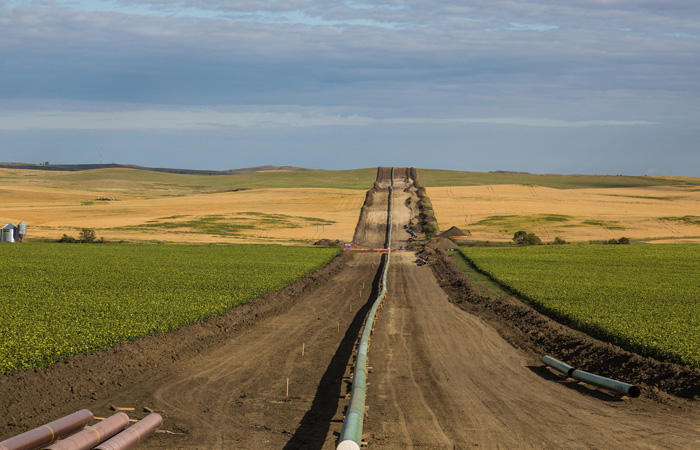Rethinking Lifestyle
Spirit of the Buffalo

Most of us have been following the controversy surrounding the proposed Trans-Mountain Pipeline which is to carry crude oil and dibit from the Athabasca region of Northern Alberta to ocean ports in Burnaby and Vancouver. Did you know that at the same time Enbridge Energy has been quietly expanding its own Line 3 pipeline from the Athabasca region through Saskatchewan and western Manitoba into North Dakota near Gretna? I did not, until last week when I responded to an invitation to join others on a visit to the Spirit of the Buffalo Camp near Gretna.
I now know that Line 3 was first built in the 1950s to carry Alberta crude to Superior, a US port on Lake Superior. At that time it was built primarily to carry high quality crude oil, but not any more. The demand today is for a pipeline to carry dilbit and bitumen, rather than high quality crude. Because of this, and because the pipeline is getting old, Enbridge is now wanting or needing to replace it.
So why should residents of southeastern Manitoba be concerned about this? The proposed pipeline does not flow through our area.
To my way of thinking, expressing concern about climate change and at the same time favouring pipeline expansion makes no sense. OK, so we are committed to a lifestyle highly dependent on cheap fossil fuel. Like it or not, that’s where we are at now, and changing that lifestyle is not going to be easy. We need to accept that. But the purpose of expanding our pipeline system is to increase the consumption of oil. We don’t need that, and we should not want that! Favouring and facilitating pipeline expansion supports the wrong trajectory. Our trajectory needs to be towards lowering the production of Greenhouse Gases and lowering our consumption and dependence on fossil fuels.
But, I hear, pipelines are safer than rail transportation, and our railways already are reluctant to allocate cars to haul grain, when hauling oil is so much more lucrative. That may all be so. I don’t know what could be done to make the transportation oil by rail safer, and I also don’t know what could be done to motivate the rail companies to give greater priority to transporting grains. I concede that these problems are real, but surely to increase the capacity to move oil can’t be seen as the sensible response to that situation! The appropriate, sensible response is to reduce the demand for oil.
The other issue I have with this approach to economic development is that resource based development is, by definition, short sighted. We are told that Canada has the third largest oil deposits of any country in the world. We hear that and we feel rich. But we should also bear in mind that 97% of those deposits are too deep to be mined. Of course we may yet develop technology that will allow us to extract more than 3% of these deposits, but at what cost? The earliest conventional oil yielded 100 units of energy for every energy unit expended. The conventional oil accessed today will yield 25 units for every unit expended. The tar sands yield only 5 units energy for every energy unit expended. As we get further into the tar sands, the efficiency will decrease further. So why should we want to increase our capacity to extract this resource. To me this makes no sense. We have current capacity to move oil, and I have little doubt that the oil supplies we have will be exhausted if we continue to move them at the current rate. What merit is there in increasing our capacity to extract? It only means that less of this precious stuff will be left for those who follow us.
The Spirit of the Buffalo Camp is there because of the energy and vision of Geraldine McManus, a Dakota woman committed to protecting the planet within her circle of influence. Thanks to that commitment, I now know about Line 3, and you do too. You and I will need to decide what we do with this knowledge.




